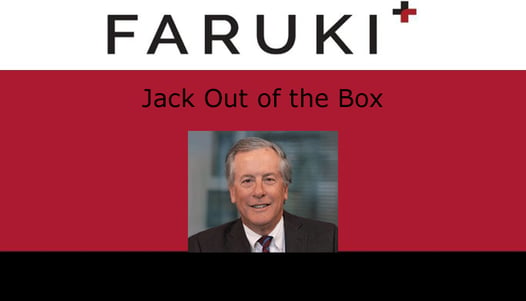- July 3, 2024
- Jack Greiner
- Jack Out of the Box
 The United States Supreme Court recently dismissed a case that sought to enjoin certain government officials from "censoring" the online speech of social media users. The Court found that the plaintiffs in the case couldn't establish that they'd been injured by any conduct of the government officials.
The United States Supreme Court recently dismissed a case that sought to enjoin certain government officials from "censoring" the online speech of social media users. The Court found that the plaintiffs in the case couldn't establish that they'd been injured by any conduct of the government officials.
During the 2020 election season and the COVID–19 pandemic, social-media platforms frequently removed, or fact checked posts containing allegedly false or misleading information. At the same time, federal officials, concerned about the spread of "misinformation" on social media, communicated extensively with the platforms about their content-moderation efforts. The plaintiffs, two States (Louisiana and Missouri) and five social-media users, sued dozens of Executive Branch officials and agencies, alleging that they pressured the platforms to suppress protected speech in violation of the First Amendment. The Fifth Circuit agreed, concluding that the officials' communications rendered them responsible for the private platforms' moderation decisions. It then affirmed a sweeping preliminary injunction.
In a decision authored by Justice Barrett, the Supreme Court struck down the injunction. Justices Roberts, Kavanaugh, Sotomayor, Kagan and Jackson joined. Justices Alito, Thomas, and Gorsuch dissented. The majority found that the plaintiffs couldn't establish standing. They failed to show they suffered an injury caused by any of the defendants.
As initially filed, the suit appeared to be more of a political statement than a lawsuit. The gist of the suit was that the Biden administration, and agencies under its direction, were coercing social media sites such as Twitter and Facebook, to shut down content related to misinformation about COVID and the 2020 election. The plaintiffs alleged, and the lower courts agreed, that the social media platforms "have engaged in censorship of certain viewpoints on key issues," while "the government has engaged in a yearslong pressure campaign" to ensure that the platforms suppress those viewpoints. Great talking point. But the plaintiffs couldn't back it up with any actual evidence. As the Court noted, "[t]he primary weakness in the record of past restrictions is the lack of specific causation findings with respect to any discrete instance of content moderation."
The Court pointed out that: "[i]n fact, the platforms, acting independently, had strengthened their pre-existing content moderation policies before the Government defendants got involved. For instance, Facebook announced an expansion of its COVID–19 misinformation policies in early February 2021, before White House officials began communicating with the platform. And the platforms continued to exercise their independent judgment even after communications with the defendants began. For example, on several occasions, various platforms explained that White House officials had flagged content that did not violate company policy. Moreover, the platforms did not speak only with the defendants about content moderation; they also regularly consulted with outside experts. This evidence indicates that the platforms had independent incentives to moderate content and often exercised their own judgment. To be sure, the record reflects that the Government defendants played a role in at least some of the platforms' moderation choices. But the Fifth Circuit, by attributing every platform decision at least in part to the defendants, glossed over complexities in the evidence."
Despite their bluster, plaintiffs could not establish a critical, threshold fact -- that a particular defendant pressured a particular platform to censor a particular topic before that platform suppressed a particular plaintiff 's speech on that topic. Failing that, plaintiffs failed to establish injury from the defendants' past conduct. And this was problematic going forward as well because the plaintiffs failed to show they needed injunctive relief to prevent specific conduct from reoccurring. Again, the Court noted "[t]he plaintiffs treat the defendants as a monolith, claiming broadly that "'the governmen[t]'" continues to communicate with the platforms about "'content-moderation issues.'" . . . But the plaintiffs could not show that any "[g]overnment defendant continues to engage in the challenged conduct, which is 'coercion' and 'significant encouragement,' not mere 'communication.'"
The plaintiffs can (and likely will) continue to harp on their alleged grievances in the court of public opinion. But in a court of law, one needs actual evidence.
